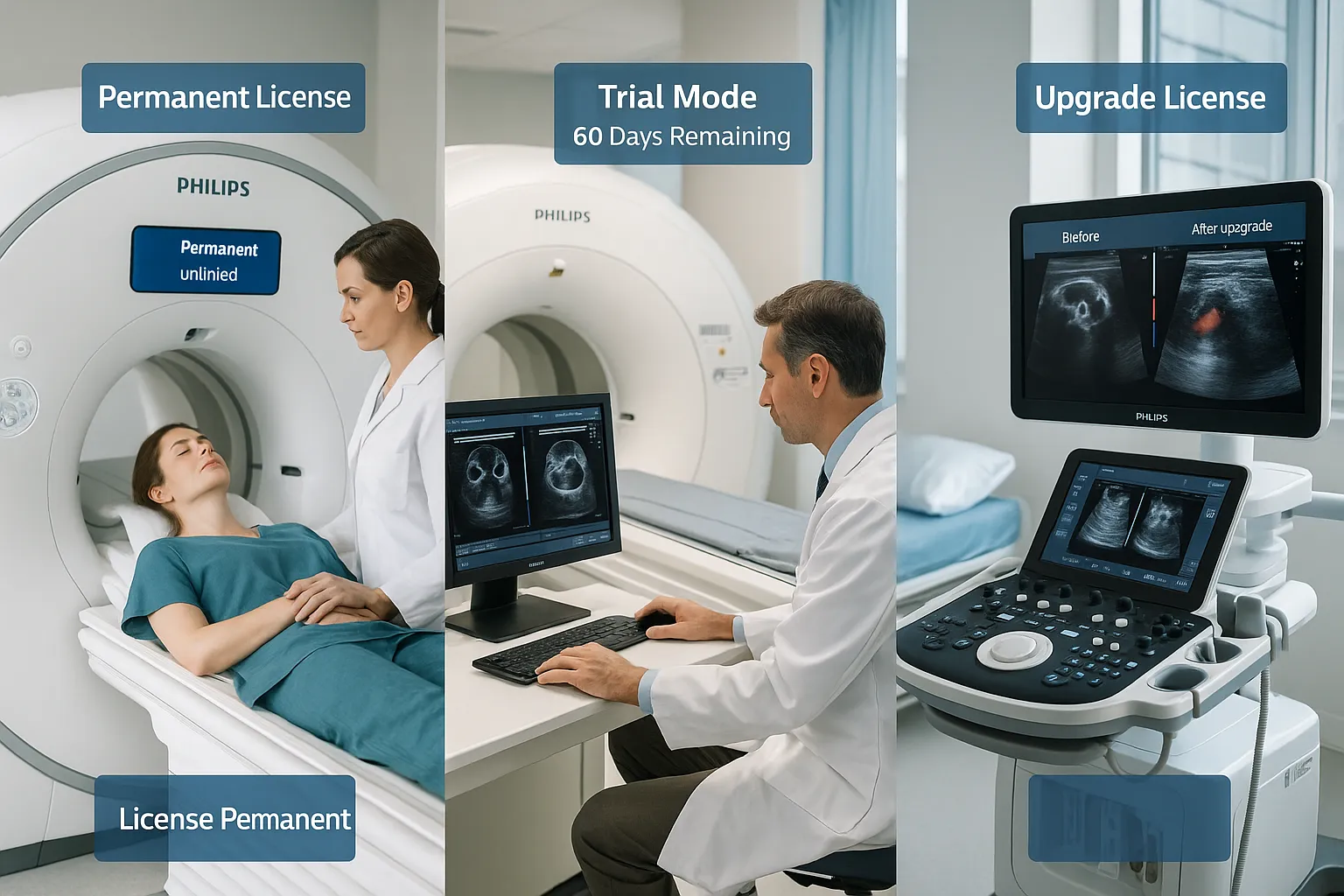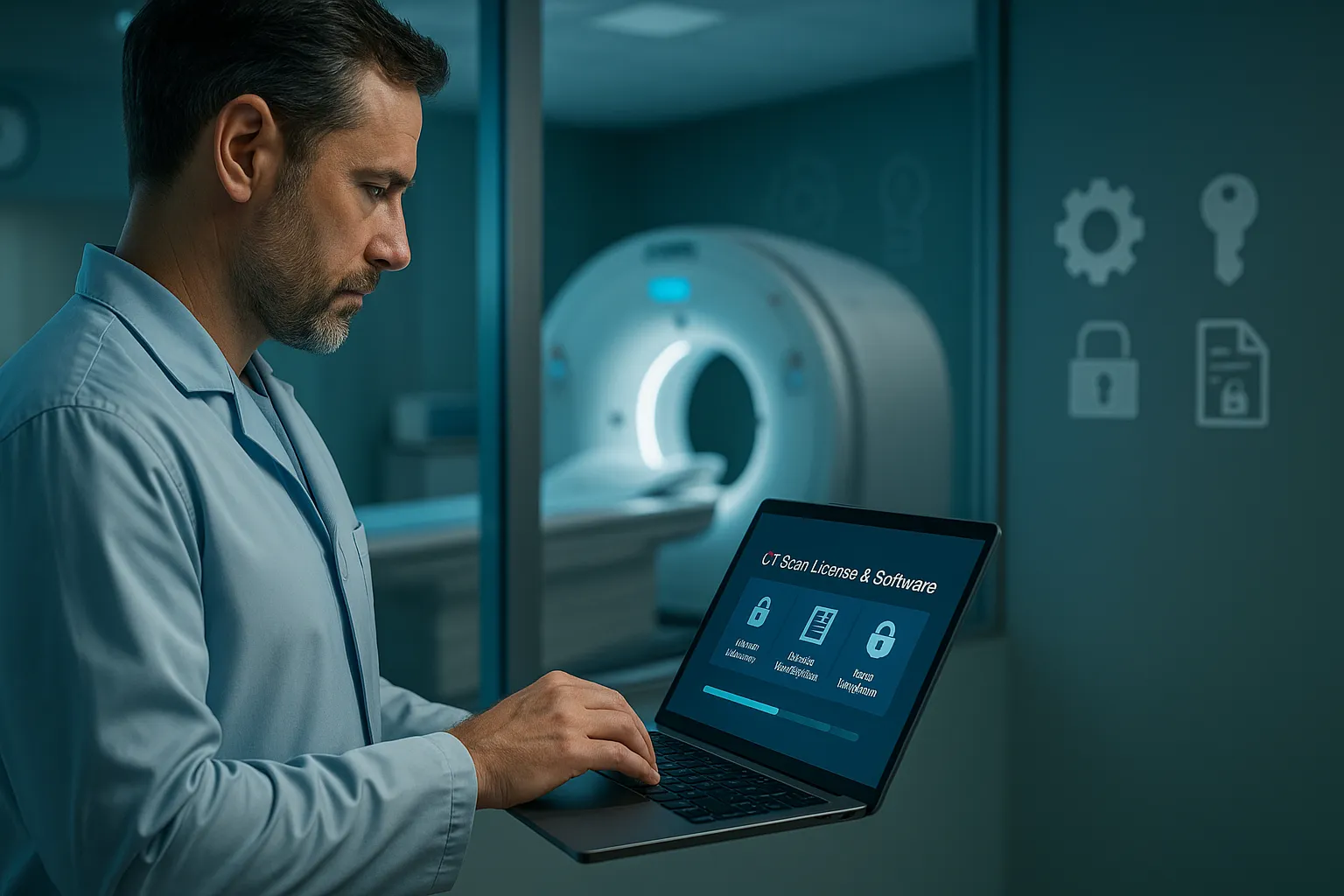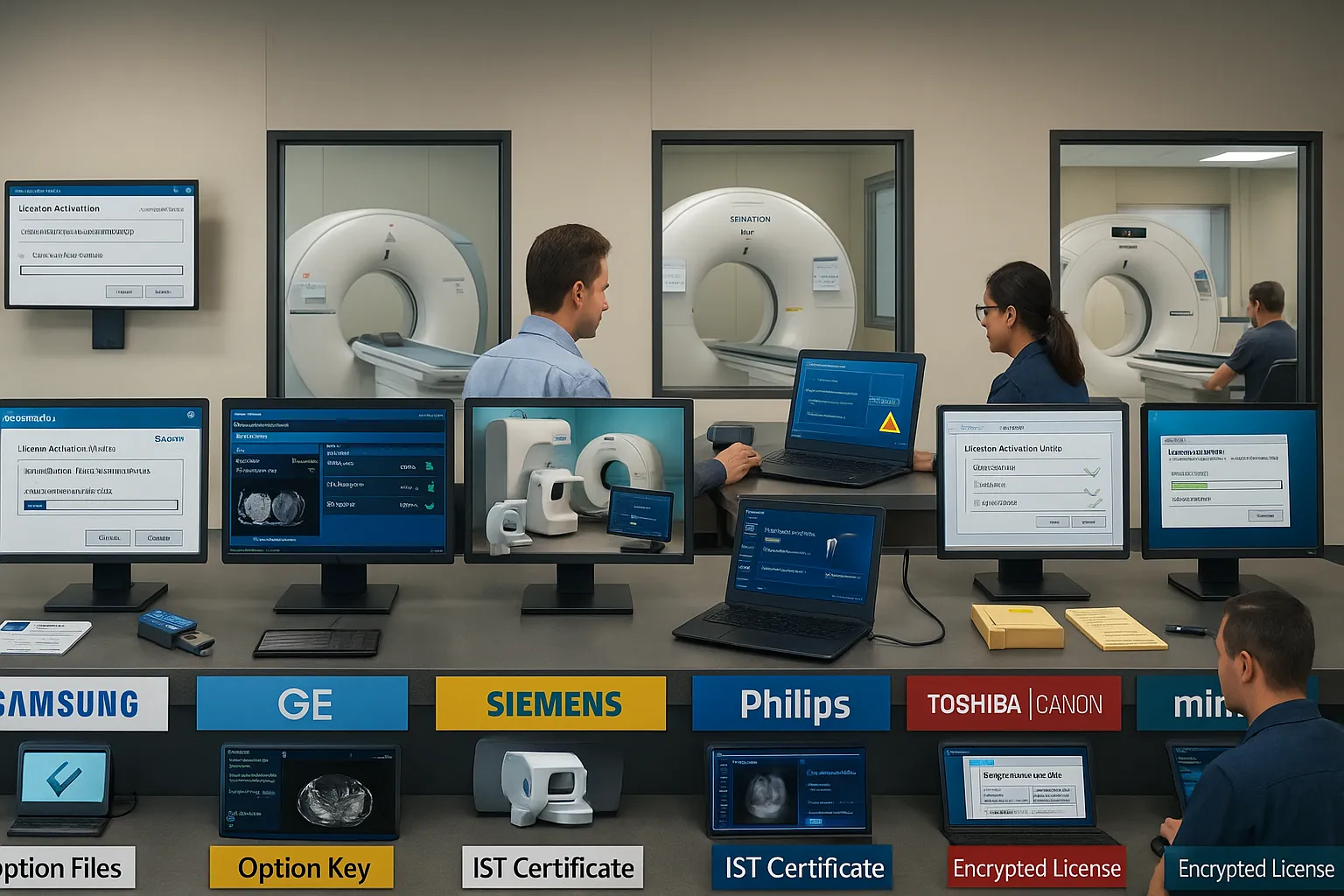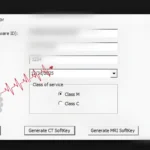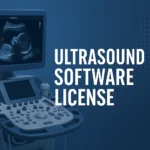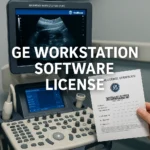Provider of Certified Philips Medical Device Licenses and Activation Support
Looking for trusted solutions for your Philips medical systems? We provide:
✔️ Genuine Philips License Keys and Activation Services for a wide range of devices.
✔️ Licensing options for Philips systems including: Ultrasound, MRI, CT Scanners, and more.
✔️ Customized solutions to meet the operational needs of hospitals, clinics, and imaging centers—ensuring full functionality and compliance.
📩 For direct assistance, reach out via WhatsApp: +967 775455559
Let us help you unlock the full potential of your Philips medical equipment! 🌟
Introduction
Imagine facing a critical patient diagnosis, your Philips MRI or ultrasound equipment suddenly stops functioning—simply because of a licensing oversight. Every minute counts, and your reputation hangs in the balance. That’s why buying a genuine Philips medical device license isn’t just essential; it’s non-negotiable. This guide walks you through everything you need to know, from the importance of authentic licensing and ensuring regulatory compliance to seamless activation processes. Discover how to secure your investment, optimize equipment performance, and maintain uninterrupted patient care. Keep reading—your peace of mind starts right here.
What is a Philips Medical Device License?
Understanding exactly what a Philips medical device license is, and why it’s essential, can protect healthcare providers from operational disruptions and regulatory risks. These licenses authenticate the software within Philips medical devices, ensuring compliance, functionality, and full access to advanced diagnostic features, which are critical for patient care and facility efficiency.
Definition & Importance
A Philips medical device license is an official authorization provided by Philips Healthcare that unlocks specific software functionalities within medical equipment. These licenses guarantee that devices such as MRI machines, CT scanners, and ultrasound systems operate securely, reliably, and compliantly. Without an official license, devices risk limited functionality or even complete downtime, severely affecting medical workflows and patient outcomes.
For example, a hospital using licensed Philips imaging software can confidently run diagnostics and provide accurate patient results without fear of sudden software malfunctions. Conversely, healthcare facilities operating without authentic licenses have faced unexpected equipment shutdowns, leading to patient-care interruptions and potential legal ramifications.
Devices Requiring Licensing
Various Philips medical devices require proper licensing to operate effectively. Common equipment includes MRI machines such as the Philips Ingenia series, advanced ultrasound systems like the Philips EPIQ range, CT scanners, and patient-monitoring devices. Each license typically corresponds directly to the particular device model and software version, ensuring precise compatibility and optimal performance.
For instance, a diagnostic imaging center equipped with Philips EPIQ ultrasound systems must ensure valid licensing to access critical imaging capabilities like elastography or advanced 3D visualization. Recently, a facility found their device operating at reduced capacity due to an expired license, emphasizing the critical need for careful monitoring and timely renewal of Philips medical device licenses.
Why Should You Buy a Genuine Philips Medical Device License?
Investing in a genuine Philips medical device license isn’t merely a procedural formality—it’s essential for safeguarding device performance, patient safety, and legal compliance. Genuine licensing ensures the authenticity of your medical software, protecting your healthcare practice from operational risks, regulatory fines, and compromised patient care quality.
Ensuring Device Functionality
Using authentic Philips licenses guarantees that your medical devices function exactly as intended. Unauthorized or counterfeit licenses may initially appear cost-effective, but frequently result in reduced functionality, software malfunctions, or sudden equipment failures. Genuine licenses provide reliable access to software updates, improved diagnostic accuracy, and enhanced operational stability.
Consider the case of a diagnostic imaging center that faced an abrupt MRI shutdown during peak patient hours due to using an unauthorized activation key. This event led to canceled patient appointments, compromised clinical outcomes, and significant financial losses. Conversely, a facility operating with genuine Philips licenses consistently experiences optimal performance, avoiding unnecessary downtime.
Legal & Regulatory Compliance
Acquiring genuine Philips medical device licenses is critical for maintaining legal and regulatory compliance with bodies like the FDA, ISO, and regional healthcare authorities. Using unlicensed or counterfeit software can lead to severe penalties, including costly fines, lawsuits, and potential loss of medical accreditation, significantly damaging a healthcare provider’s reputation and operational viability.
For instance, a healthcare facility once incurred substantial financial penalties after an audit revealed the use of unlicensed Philips imaging software. By contrast, a compliant hospital utilizing verified Philips licenses passed regulatory inspections seamlessly, bolstering its credibility and maintaining high-quality patient care standards.
Optimizing Device Performance
Genuine Philips licenses enable medical providers to optimize device performance by unlocking advanced features and regular software enhancements. Such upgrades can improve diagnostic accuracy, shorten scan times, and elevate patient comfort, thereby increasing clinical efficiency and patient satisfaction.
A real-world example includes a hospital that upgraded their Philips ultrasound software license, immediately noticing improvements in imaging quality and faster processing times. This not only streamlined patient scheduling but also significantly enhanced diagnostic capabilities, demonstrating the tangible benefits of maintaining authentic, up-to-date Philips licensing.
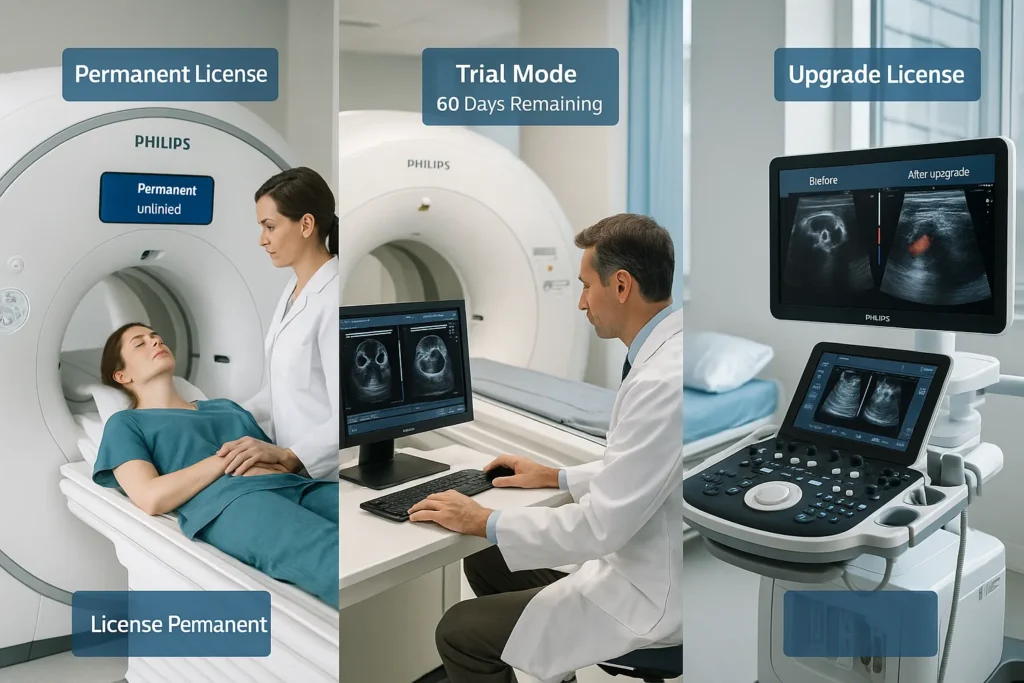
Types of Philips Medical Device Licenses
Selecting the appropriate Philips medical device license type is crucial for aligning with your healthcare facility’s specific needs, operational goals, and budget considerations. Understanding the differences among permanent, temporary, and upgrade licenses enables providers to make informed decisions, ensuring optimal equipment performance, regulatory compliance, and cost-effectiveness.
Permanent Licenses
Permanent licenses from Philips provide ongoing, uninterrupted access to critical software functionalities without expiration. Typically suited for high-utilization medical devices, such as MRI machines or advanced ultrasound equipment, these licenses offer long-term stability and peace of mind, eliminating frequent renewals or downtime associated with license expiration.
For instance, a hospital performing hundreds of MRI scans monthly benefits significantly from a permanent Philips MRI license. With stable, lifetime access, the hospital avoids recurrent expenses and administrative tasks related to license renewals, resulting in uninterrupted patient care and more predictable budgeting and planning.
Temporary/Trial Licenses
Temporary or trial licenses are short-term solutions that allow healthcare providers to evaluate new or advanced software functionalities before committing to a permanent license. These licenses typically last between 30 to 90 days and offer a cost-effective approach for facilities exploring additional features, performing clinical trials, or experiencing fluctuating patient demand.
Consider a diagnostic center contemplating an upgrade to Philips’ latest CT imaging software. Initially, they obtained a 60-day trial license, enabling thorough assessment of new features like improved image reconstruction or dose-reduction technologies. This trial period provided valuable operational insights, ensuring an informed decision before committing to long-term investments.
Upgrade Licenses
Upgrade licenses enable existing Philips medical devices to access enhanced software features, improvements, and expanded capabilities. These licenses are essential for healthcare facilities aiming to maintain technological competitiveness, comply with updated regulatory standards, or improve patient care quality by adopting cutting-edge medical advancements.
For example, a regional imaging clinic recently upgraded its Philips ultrasound systems with an advanced imaging software license, significantly enhancing image clarity and diagnostic accuracy. This strategic upgrade enabled the clinic to attract new patients, streamline workflows, and elevate its clinical reputation, illustrating the tangible benefits of timely software upgrades.
How to Buy a Philips Medical Device License
Purchasing a Philips medical device license is a critical step in ensuring that your equipment remains functional, compliant, and supported. Understanding where to buy, how to verify sellers, and what steps to follow helps healthcare providers avoid counterfeit licenses, wasted investment, and potential legal risk. This section will guide you through every part of the purchasing journey with clarity and confidence.
Identifying Genuine Sellers
When buying a Philips medical device license, it is essential to work with authorized resellers or certified service providers. Genuine sellers follow Philips’ licensing protocols, provide verified activation keys, and offer after-sales technical support. You can typically find these sellers listed on Philips’ official website or through trusted industry partners.
👉 We provide authentic Philips medical license solutions, including license sales and professional activation services. To get started, contact us directly via WhatsApp at +967 775455559.
For example, a radiology clinic once purchased a low-cost license from an unofficial third-party source, only to discover that the key was blacklisted by Philips. They then turned to an authorized provider and not only received a valid key but also gained access to regular updates and expert support—highlighting the importance of legitimacy over shortcuts.
Step-by-Step Buying Guide
Consultation & Device Assessment – Begin by identifying your device model and the specific license needed. A certified reseller will help match the right software license to your equipment and clinical needs.
Quotation & License Type Selection – Choose between permanent, trial, or upgrade licenses based on your operational demands. Request a formal quote and service terms.
Payment & License Issuance – Once payment is processed, you’ll receive your activation key securely, along with installation and validation documentation.
Activation & Verification – Follow the official instructions provided or request on-site/remote activation by a certified technician to avoid errors.
For instance, a regional hospital buying a Philips ultrasound software license followed these steps through bmeser.com and completed their activation within 24 hours—no downtime, no complications.
Pricing and Cost Considerations
License pricing varies based on several factors, including device type, software complexity, license duration, and the provider. Permanent licenses tend to be higher in upfront cost but are more economical over time, whereas trial or upgrade licenses might be more accessible for budget-conscious facilities.
For example, a clinic comparing two providers found that while one offered a cheaper upfront price, it lacked post-sale support. The second provider offered slightly higher pricing but included a one-year warranty and update guarantee—delivering more long-term value. Always weigh immediate costs against operational risk, support quality, and reliability.
Activation & Verification of Philips Licenses
Activating and verifying a Philips medical device license is a crucial step to unlock your equipment’s full capabilities and ensure safe, compliant operation. Whether you’re installing a new license or upgrading an existing one, following the correct process helps avoid technical issues, legal risks, and operational downtime. This section breaks down how activation and verification work and why they matter.
License Activation Procedure
Activating a Philips license typically involves entering a unique license key into the device’s software interface. The activation process confirms that the license is valid for that specific device model and software version. Depending on your system, activation may be done online or offline, and may require Philips-approved tools or service software to finalize the process.
For instance, a clinic installing a new Philips EPIQ ultrasound system needed to activate advanced elastography features. By following the guided activation steps provided by an authorized vendor, the activation was completed in under 30 minutes—no downtime, no diagnostic interruption. When performed correctly, activation ensures access to the full feature set and eligibility for future updates.
Verifying Authenticity of Licenses
Verifying your license post-activation is essential to ensure it is legitimate and fully supported. Philips provides a license verification tool through its official software or service interface, allowing healthcare providers to confirm license status, type, and expiration (if applicable). This is especially important when acquiring licenses from third-party vendors.
For example, a medical center unknowingly installed a counterfeit license purchased through a non-certified reseller. After running a license verification, Philips flagged the activation key as invalid—forcing the clinic to pause imaging services until a genuine license was installed. To prevent such disruptions, always verify immediately after activation and retain documentation from the seller.
👉 To simplify the process, we offer professional Philips license activation services, including step-by-step guidance and post-installation verification. Contact us directly via WhatsApp at +967 775455559 to ensure your activation is secure and successful.
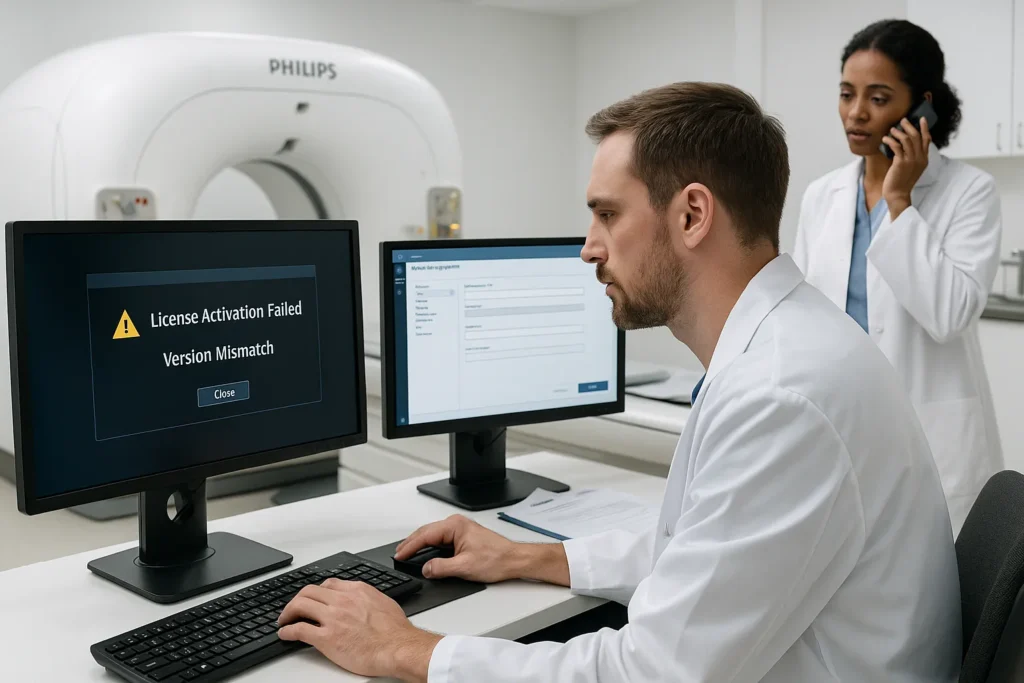
Common Issues & Troubleshooting
Even with a valid Philips medical device license, users may occasionally encounter challenges during activation, verification, or ongoing use. Recognizing the most common issues—and knowing how to respond to them—can help avoid equipment downtime, maintain diagnostic efficiency, and reduce frustration. This section outlines key troubleshooting scenarios and solutions every healthcare provider should be prepared for.
Typical License Activation Issues
One of the most common issues occurs when the license key doesn’t match the specific model or software version of the device. This typically results in an error message or incomplete feature activation. Another frequent problem is internet connectivity—some activation methods require a secure online connection with Philips’ licensing servers, and any disruption can halt the process.
For instance, a diagnostic center tried activating a Philips CT scanner with a license key intended for an older firmware version. The mismatch led to partial system functionality and forced a rollback. After consulting with an authorized provider, the correct key was installed, restoring full features. This highlights the importance of version verification before activation.
Best Practices for Troubleshooting
If your Philips device license fails to activate or verify, first confirm basic steps: double-check the device model, ensure software compatibility, and inspect for typos in the key. If activation still fails, consult Philips’ official diagnostic tools or contact a verified technical support partner. Always keep a backup of the license documentation and installation logs.
For example, a clinic experienced repeated license rejections due to a corrupted installation file. Upon review, they discovered their installer had been modified during transfer. Re-downloading the installer from an official source resolved the issue. Additionally, we recommend reaching out directly to trusted service providers—like our team—for remote or on-site assistance to ensure smooth activation and long-term system stability.
👉 Need immediate help? We offer fast-response troubleshooting and activation support for Philips licenses via WhatsApp: +967 775455559.
Related Philips License FAQs
Many healthcare professionals have recurring questions when purchasing or managing Philips medical device licenses. Clarifying these points can prevent costly mistakes and help ensure uninterrupted device operation. Below are answers to the most commonly asked questions, offering insight into licensing duration, transferability, and upgrades.
How long does a Philips medical device license last?
A Philips medical device license can be permanent or temporary. Permanent licenses offer unlimited use without expiration, while temporary licenses typically last 30 to 90 days, depending on the product and use case.
Can a Philips license be transferred to another device?
Philips licenses are generally tied to a specific device and are not transferable. However, in cases like equipment replacement or upgrade, license transfer may be approved by Philips upon request.
How do I upgrade my Philips license?
To upgrade your Philips license, contact an authorized Philips reseller to purchase the required software module or feature. Activation typically involves entering a new license key into the device to unlock additional capabilities.
Conclusion
A Philips medical device license is more than a software key—it’s a cornerstone of compliant, uninterrupted, and high-performing medical imaging operations. As healthcare technology evolves, so does the need for proper licensing to maintain system integrity, diagnostic accuracy, and legal readiness. In this final section, we’ll reinforce why genuine licensing is essential and how it safeguards your investment and clinical reputation.
Protect Your Investment
Genuine Philips licenses help protect the long-term value of your medical devices. They unlock authorized features, maintain compatibility with future updates, and ensure that devices function exactly as designed. Investing in valid licenses reduces the likelihood of technical failures, legal disputes, or denied manufacturer support.
A diagnostic center in Jordan installed genuine licenses across all Philips systems, which resulted in fewer service calls and more consistent uptime. This protection not only safeguarded their hardware investment but also boosted trust with referring physicians and patients.
Ensure Operational Compliance
Compliance with health authorities and accreditation bodies depends heavily on proper device licensing. FDA regulations, ISO standards, and regional guidelines often require proof of authorized software use. Failure to comply can result in failed inspections, legal penalties, and loss of accreditation.
For example, a hospital undergoing an ISO audit passed with zero violations due to meticulous documentation of its licensed Philips software. The audit team highlighted the facility’s proactive license management as a model for other institutions.
Maintain Optimal Diagnostic Performance
Licensed software ensures your Philips equipment operates at its highest potential—offering access to premium imaging features, diagnostic tools, and performance enhancements. Upgrades and feature packs delivered through valid licensing improve patient throughput and clinical confidence.
A cardiology clinic that upgraded its Philips ultrasound license with advanced imaging modules saw a 30% improvement in diagnostic turnaround time. The staff also reported more detailed cardiac evaluations, increasing both patient satisfaction and physician referrals.
Get Trusted Support When You Need It Most
Even experienced teams encounter challenges with license activation, expiration, or upgrade planning. Working with a trusted partner ensures smoother implementation, less downtime, and peace of mind.
In today’s fast-paced clinical environment, securing a genuine Philips medical device license isn’t optional—it’s essential. From understanding license types to ensuring regulatory compliance, protecting your equipment investment, and maximizing diagnostic performance, every section of this guide highlights one truth: licensing is the gateway to safe, efficient, and future-ready healthcare delivery. Whether you’re activating, upgrading, or troubleshooting, trusted support makes the difference. 💡 Don’t wait for downtime or audit failures—act now. Contact a verified provider, validate your license, and keep your Philips devices operating at full potential.
👉 We specialize in providing verified Philips licenses, activation support, and expert troubleshooting. For fast assistance or to buy a Philips medical license, reach out to us via WhatsApp at +967 775455559. For more about Philips , visit our website here

